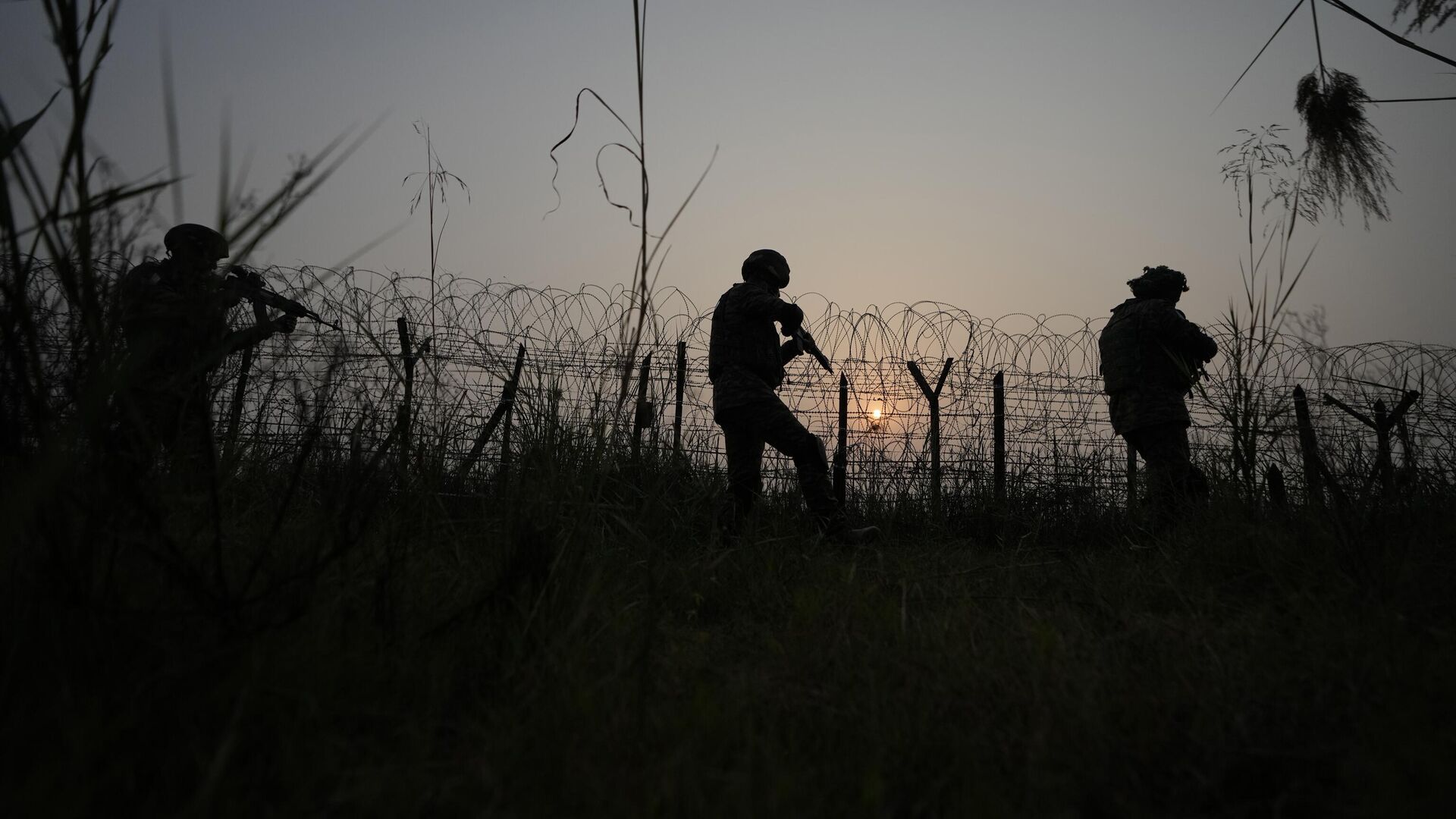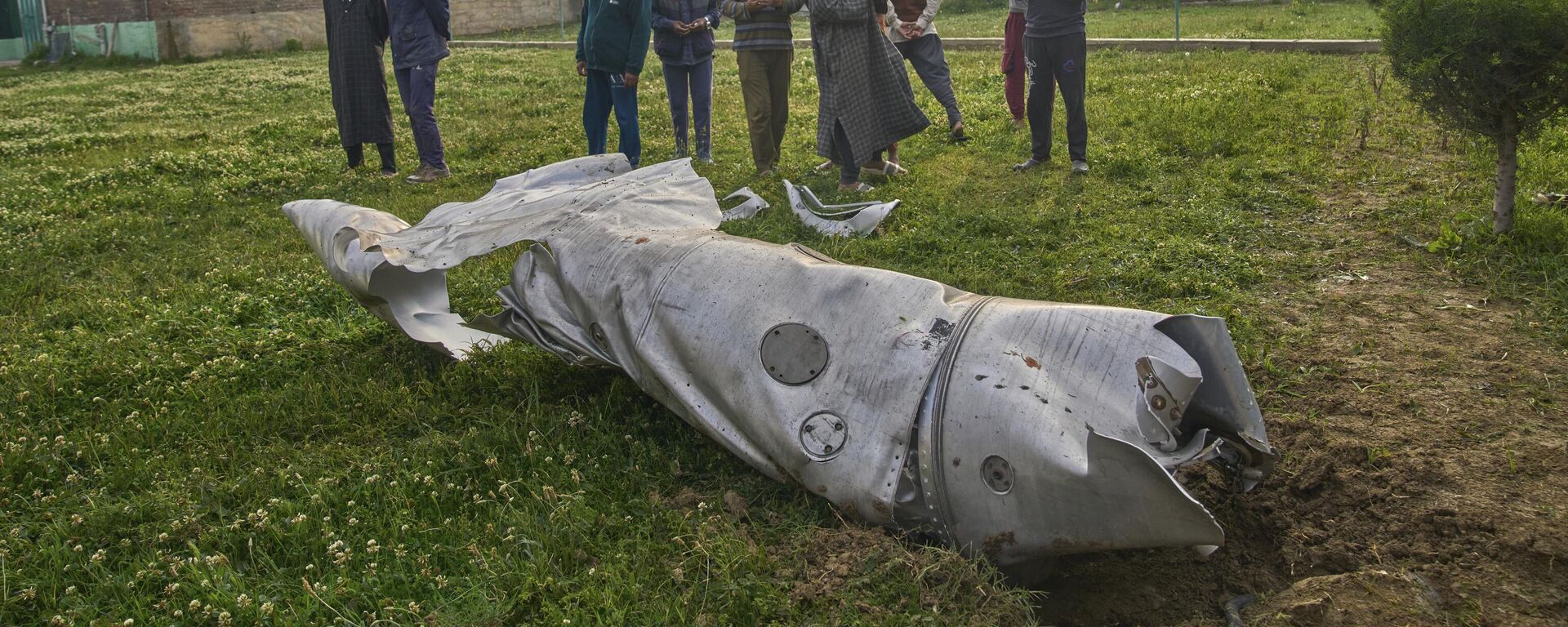https://sputniknews.in/20250507/operation-sindoor-india-sends-a-clear-message--nowhere-is-safe-for-terrorists-vets-9080264.html
Operation Sindoor: India Sends a Clear Message — Nowhere Is Safe for Terrorists: Vets
Operation Sindoor: India Sends a Clear Message — Nowhere Is Safe for Terrorists: Vets
Sputnik India
India carried out pre-dawn precision strikes, dubbed Operation Sindoor, on terror launch pads across nine sites in Pakistan and Pakistan-administered Kashmir... 07.05.2025, Sputnik India
2025-05-07T20:50+0530
2025-05-07T20:50+0530
2025-05-07T20:50+0530
sputnik opinion
india
pakistan
line of control (loc)
operation sindoor
pahalgam terror attack
terror outfits
terrorism
cross-border terrorism
terrorist attack
https://cdn1.img.sputniknews.in/img/07e9/04/1e/9046565_0:160:3072:1888_1920x0_80_0_0_a05973c39fcd254e1cb3dba463a43b1a.jpg
Operation Sindoor strikes at the very core of the radical militant mindset driving terrorism in Pakistan, with terrorists now fearing they will be tracked and hunted down if they commit acts of terror in India, military pundits have told Sputnik India.At the same time, the duo of retired Indian Army officers thinks that an all-out war between the two nuclear-armed neighbours is improbable despite India's military action today.He suggested that if any of the above happens, "India will respond with a counter-strike using sophisticated, high-tech weaponry", potentially escalating the situation further.Unless Pakistan takes a "reckless step like crossing the LoC or attacking an Indian post, full-scale mobilisation is unlikely", he said. Even then, it would likely lead to a "limited sectoral conflict, not a full-fledged war," the defence analyst noted.From the outset, India made it clear that it sought to target only the terror infrastructure within Pakistan and Pakistan-administered Kashmir, and not an all-out war, according to retired Major General RPS Bhadauria, Additional Director General of the Centre for Land Warfare Studies (CLAWS). Pakistan is not in a position to sustain such a conflict, he told Sputnik India.Since the Pahalgam massacre, India has repeatedly said that it wanted to bring the perpetrators of the heinous terror attack to justice. In that context, India initially put the Indus Water Treaty in abeyance and took other measures, like banning imports from Pakistan, the veteran pointed out.Operation Sindoor is India's next step, with the right to retaliate if Pakistan responds to its precision strikes. The onus of de-escalation now lies with Pakistan, he believes.Pakistan’s response is driven by the need to appear strong domestically, but the scale and nature of their reaction remain uncertain, he said, adding that India will assess their response before determining its next move."The mentality of Jihad is deeply rooted within certain circles in Pakistan," Sharma highlighted, citing a recent example from a statement made by Pakistan's Chief of Army Staff, General Asim Munir.Bhadauria believes that India's Operation Sindoor has sent a clear message to terror operatives and their handlers in Pakistan, demonstrating that India will target terrorists wherever they are.
https://sputniknews.in/20250507/india-launches-cross-border-strikes-against-pakistan-in-response-to-pahalgam-attack-misri-9079056.html
india
pakistan
line of control (loc)
jammu and kashmir (j&k)
kashmir valley
Sputnik India
feedback.hindi@sputniknews.com
+74956456601
MIA „Rossiya Segodnya“
2025
Pawan Atri
https://cdn1.img.sputniknews.in/img/07e6/0c/13/139630_147:0:831:684_100x100_80_0_0_8fa2b25903e7787fe6a2698552c167df.png
Pawan Atri
https://cdn1.img.sputniknews.in/img/07e6/0c/13/139630_147:0:831:684_100x100_80_0_0_8fa2b25903e7787fe6a2698552c167df.png
News
en_IN
Sputnik India
feedback.hindi@sputniknews.com
+74956456601
MIA „Rossiya Segodnya“
Sputnik India
feedback.hindi@sputniknews.com
+74956456601
MIA „Rossiya Segodnya“
Pawan Atri
https://cdn1.img.sputniknews.in/img/07e6/0c/13/139630_147:0:831:684_100x100_80_0_0_8fa2b25903e7787fe6a2698552c167df.png
india, pakistan, line of control (loc), operation sindoor, pahalgam terror attack , terror outfits, terrorism, cross-border terrorism, terrorist attack, counter-terrorism, kashmir conflict, jammu and kashmir (j&k), kashmir valley
india, pakistan, line of control (loc), operation sindoor, pahalgam terror attack , terror outfits, terrorism, cross-border terrorism, terrorist attack, counter-terrorism, kashmir conflict, jammu and kashmir (j&k), kashmir valley
Operation Sindoor: India Sends a Clear Message — Nowhere Is Safe for Terrorists: Vets
India carried out pre-dawn precision strikes, dubbed Operation Sindoor, on terror launch pads across nine sites in Pakistan and Pakistan-administered Kashmir, in response to last month’s Pahalgam attack that killed 26 tourists.
Operation Sindoor strikes at the very core of the radical militant mindset driving terrorism in Pakistan, with terrorists now fearing they will be tracked and hunted down if they commit acts of terror in India, military pundits have told Sputnik India.
At the same time, the duo of retired Indian Army officers thinks that an all-out war between the two nuclear-armed neighbours is improbable despite
India's military action today.
"An all-out war between India and Pakistan would involve the full mobilisation of the Army, Navy, and Air Force, leading to an invasion, but it is unlikely. launch a similar strike on India using tactical missiles and armed drones, or carry out a sensational terrorist attack without direct attribution to them," retired Major General BK Sharma, the Director of the United Service Institution of India (USI), told Sputnik India.
He suggested that if any of the above happens, "India will respond with a counter-strike using sophisticated, high-tech weaponry", potentially escalating the situation further.
Unless Pakistan takes a "reckless step like crossing the LoC or attacking an Indian post, full-scale mobilisation is unlikely", he said. Even then, it would likely lead to a "limited sectoral conflict, not a full-fledged war," the defence analyst noted.
From the outset, India made it clear that it sought to target only the terror infrastructure within Pakistan and Pakistan-administered Kashmir, and not an all-out war, according to retired Major General RPS Bhadauria, Additional Director General of the Centre for Land Warfare Studies (CLAWS). Pakistan is not in a position to sustain such a conflict, he told Sputnik India.
"So, an all-out war was not on the table from the beginning. An all-out war is only on the escalatory metric in case Pakistan escalates the situation any further," Bhadauria suggested.
Since the Pahalgam massacre, India has repeatedly said that it wanted to bring the perpetrators of the heinous terror attack to justice. In that context, India initially put the Indus Water Treaty in abeyance and took other measures, like banning imports from Pakistan, the veteran pointed out.
Operation Sindoor is India's next step, with the
right to retaliate if Pakistan responds to its precision strikes. The onus of de-escalation now lies with Pakistan, he believes.
"India has stressed that it hit terrorist targets. However, Pakistan has denied having any such camps, claiming that the Indian military struck civilian targets to leave a window open for a counter-strike against India," Bhadauria argued.
Pakistan’s response is driven by the need to appear strong domestically, but the scale and nature of their reaction remain uncertain, he said, adding that India will assess their response before determining its next move.
"The mentality of Jihad is deeply rooted within certain circles in Pakistan," Sharma highlighted, citing a recent example from a statement made by Pakistan's Chief of Army Staff, General Asim Munir.
"One should not forget that India held 93,000 Pakistani soldiers as Prisoners of War (PoWs) in 1971, and if that could not change Pakistan's behaviour, there are doubts if it ever will. That's why there would be temporary caution and fear in the minds of Pakistani terrorists, but they would continue to look for opportunities to carry out their terror operations in India," Sharma stated.
Bhadauria believes that India's Operation Sindoor has sent a clear message to terror operatives and their handlers in Pakistan, demonstrating that India will target terrorists wherever they are.
"Besides, India showed that with the use of technology, pinpoint destruction of the target is possible, and again, its ability to know where the terrorists are hiding through intelligence gathering and electronic surveillance. This puts an immense amount of fear in the minds of the terrorists as they realise that their location is already known to the Indian Armed Forces," the strategic affairs pundit concluded.



